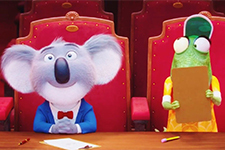Sing
|  Garth Jenning’s Sing takes place in a computer-animated world populated entirely by anthropomorphic animals and reptiles who live in a zoological version of Los Angeles, much like Disney’s recent hit Zootopia (2016), albeit without the political prescience or attention to environmental detail. If there is anything below surface level in Sing, it has something to do with the grinding, crushing, cut-throat nature of the entertainment business and show-biz economics, but it’s nothing you probably don’t know already. There is quite a lot that is dour in the film, but it wants to cruise on the energy of good ol’ fashioned pluck, ingenuity, and determination, which pretty much define the protagonist, a perpetually optimistic, theatre-loving koala named Buster Moon (Matthew McConaughey). Buster runs the Moon Theatre, a money pit that is about to sink into financial oblivion unless Buster can come up with a genuine hit (everything he has tried since buying the theatre has been a flop). He believes that the path to solvency lies in a gussied-up talent show, with all the town’s animals competing for a spot on-stage and the chance to win $1,000. The problem—aside from the general lameness of his idea—is that Buster’s secretary, a doddering old iguana with a glass eye named Miss Crawly (Jennings), accidentally sticks a couple of extra zeroes after the prize amount, leading everyone to believe that they will win $100,000, which Buster most certainly does not have. But, being a true believer in show-biz wonderment, Buster insists that the show must go on, which leads us through a series of largely predicable narrative ups and downs (although, I must admit, I was not expecting such whole-sale destruction in the third act, although the lengthy animal-karaoke finale was a given). The film’s most consistently recurring and thematically defining aesthetic technique is a revved-up camera ripping from one location to another in a blur of color and movement. We see this whizzing camera move early and often, especially as the film is introducing us to its eventual contestants: Johnny (Taron Egerton), a soulful gorilla who wants to be a singer but whose father, a gruff crime lord, wants to bring him into the family business robbing banks; Rosita (Reese Witherspoon), a frustrated housewife pig raising 25 piglets and being generally ignored by her overworked husband; Mike (Seth MacFarlane), a Frank Sinatra-esque mouse who croons tunes and plays the sax on the street; Ash (Scarlett Johansson), a teenage punk porcupine who is playing second fiddle to her less talented and emotionally abusive boyfriend; and Meena (Tori Kelly), an elephant whose beautiful voice is stymied by her crippling shyness and stage-fright. The camera zooms from character to character, giving each a brief introduction to their problems (each of which will be solved on-stage) before moving on to the next one, and the speed with which is whips down streets, up buildings, and through windows is a kind of handy metonym for the film’s hectic lack of patience. It’s not that Sing is a bad movie, but it is so scattershot and desperate to please that it ends up feeling more exhausting than fun. And, given its conceit, it can’t help but play like an animated-animal version of America’s Got Talent, with various species ripping through hits both old and new by the likes of Elton John, Taylor Swift, and Stevie Wonder. There are certainly moments of amusement scattered throughout, but as a whole it is ultimately a disappointment affair, especially given Jennings’s most recent film, the clever and poignant coming-of-age dramedy Son of Rambow (2007) (he also directed the uneven 2005 adaptation of Douglas Adam’s The Hitchhiker’s Guide to the Galaxy, before which he was known as a music video director). Sing is a fairly weird film in terms of tone, with certain aspects of aimed squarely at the young set (quite a few fart jokes, plenty of physical slapstick), while others are aimed squarely at the older set (lots of adult problems, including unrewarding marriage, financial problems, and emotional abuse). This is not in any way odd for an animated film, most of which try to hit that sweet spot between entertaining little ones while not boring or insulting the adults who have to go with them, but the problem is that Sing is so consistently awkward in melding the two. It gives the film a tonal imbalance that makes you feel like you’re constantly see-sawing, with one moment pandering to tykes and the next pandering to their parents. And there are some parts that just flat-out don’t work, such as McFarlane’s Mike, who is such a despicable and ugly character that it’s hard to enjoy his Rat Pack crooning. He is the film’s most bizarre miscalculation, which the filmmakers seem to recognize since they basically flush him down the sewer at the end and forget him. Everyone else, of course, gets his or her moment in the spotlight, solving all problems by belting out familiar hits while the camera swoops and soars, eager as always to insist that this is all so much fun. It’s all too much effort for too little reward. Copyright © 2016 James Kendrick Thoughts? E-mail James Kendrick All images copyright © Universal Pictures |
Overall Rating: 
 (2)
(2)


